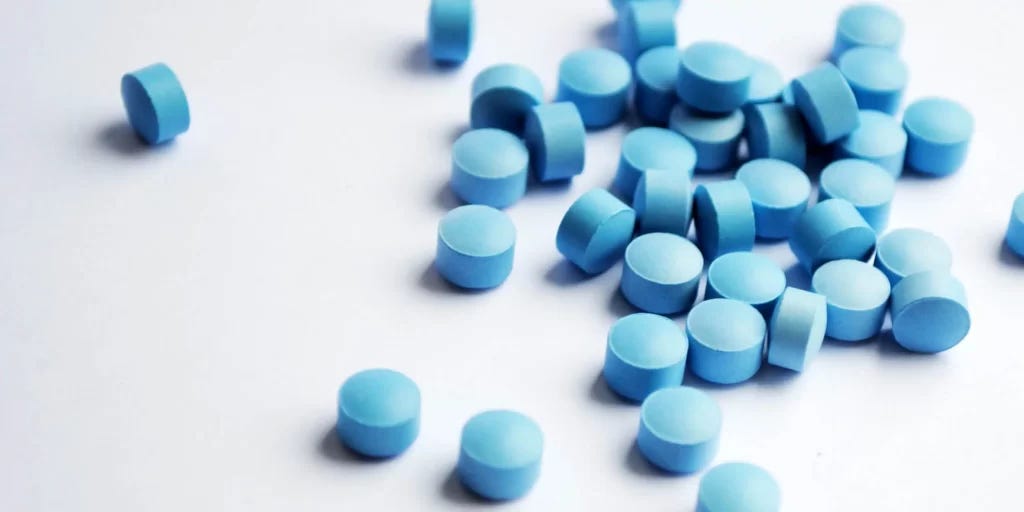Benzos! (Valium, Xanax, Klonopin, Ativan)
How ‘Mother’s Little Helper’ consumes doctors and patients alike
In the addiction clinic where I work, one would think most of our team discussions would center around fentanyl, which is killing almost one hundred thousand people a year, and which is most of what we treat. Our meetings are often hijacked by the topic of benzos (a.k.a. “benzodiazepines”). What are benzos? They are sedatives, such as Ativan (lorazepam), Klonopin (clonazepam), Valium (diazepam), or Xanax (alprazolam).
They are commonly prescribed, or used illegally, for anxiety and insomnia, or to boost the euphoric effects of other drugs. The problem is – because they work so well for anxiety, few patients ever wish to stop them. Additionally, they are highly addictive. They can cause a host of medical problems such as falls, confusion, delirium, and likely contribute to dementia. They become more dangerous as we age. They also contribute to overdose deaths when consumed with opioids and other drugs.
Many patients are taking benzos, and a subset are asking their doctors for benzos, begging their doctors for higher dosages, won’t get off them, and are refusing to stop taking them. Some are buying them on the street when they can’t find a doctor to prescribe. The supply on the street is tainted by fake benzo pills which are pressed with fentanyl. People are overdosing.
Many of us use, or have used, benzodiazepines. In fact, according to one study,
30.6 million adults (12.6%) reported past-year benzodiazepine use annually: 25.3 million (10.4%) as-prescribed and 5.3 million (2.2%) with misuse. Misuse accounted for 17.2% of benzodiazepine use overall.
That’s more than one in ten Americans! And, more almost a fifth are misusing them.
What do benzos do? Why are patients so attracted to them? How do they make other addictions more dangerous? What is a sensible way to deal with them?
Potential benefits
As a society, we are extremely stressed out. People are desperate to lessen their stress levels and go to great lengths for relief. The well-off among us do things like yoga, meditation, therapy, massages, mindfulness, prayer, and exercise. Or we do less healthy things like binge shop, binge watch, or binge eat. When these techniques don’t work, we turn to alcohol and drugs, as humans always have. The down and out among us, the poor, the homeless, the addicted, the severely mentally ill -- just grind out their dreary and excruciating lives as best they can and are even more susceptible to the toxic effects of stress.
Benzodiazepines are profoundly effective at rapidly lowering stress. They can abort a panic attack. They can help you leave your home if you are afraid to. They can help you gently glide into sleep. Like a glass of wine, they can alleviate social anxiety. They can temporarily quell the effects of trauma. Some of them can even relax your spasming muscles. They can allow you to face a day that otherwise might seem to be overwhelmingly stressful. They also can be invaluable at treating chronic stress in a subset of patients.
The problem is: they work too well. It is so easy, effective, and comforting to simply take a drug and turn off the stress. Benzos should never be the first thing that a doctor tries for anxiety. They should be prescribed after everything else fails, such as mindfulness, cognitive behavioral therapy, exercise, nutrition, social support groups, etc. If physicians are too quick to drug a problem into remission, the patient never learns how to self-manage their stress or how to self-soothe.
I know from personal experience that benzos can be extremely helpful – in the short term - for extreme anxiety. I’ve been on them in the past, during my thermonuclear divorce, which, with two little kids involved, was intolerably stressful. Many of the details of what made my divorce so bizarrely insane and out of control are in my memoir, “Free Refills.” I also was working eighty hours a week as a newly minted primary care doctor, just starting the 25-year grind (which I’m still in) that would come to suck out my entire soul.
During this difficult period, without benzos, I couldn’t sleep, and I couldn’t function under this type of stress. I was constantly agitated. I could barely think straight. A reasonable dose of clonazepam (Klonopin), prescribed by my trusty psychiatrist, would slow down my revving body and mind to the point that I had a chance to recover my center. It often made the difference between an entire night spent ruminating and a reasonably good night’s sleep. Without clonazepam, I doubt that I would have survived medical school because, after an abusive 36-hour shift, you absolutely need to sleep (and it certainly didn’t help to come home to an unstable partner). I never needed to take them before, or during work, but they were invaluable, in some ways even more than cannabis was, in helping me shift gears, to phase shift into the relaxation and recovery part of the post-workday.
For certain patients, benzos are lifesaving. For many others, they are used with great benefit. When used appropriately, they can be game changing. Despite the tenor of this blog, I am not in favor of unreasonably restricting the use of benzos or making them too difficult patients to obtain, if needed.
What are the harms
Once a patient gets put on benzodiazepines (“benzos”) such as alprazolam (Xanax), lorazepam, or valium (Diazepam), they rarely get off. They can become benzo lifers. This drug is what the song “Mother’s Little Helper” was about. That is why thirty million Americans are currently taking them. As a friend of mine, an addiction psychiatrist, used to say, “don’t take off if you don’t know how to land.” (i.e., don’t start people on highly addictive substances if you don’t have a coherent plan to get them off at some point).
People get stuck on benzos partly because of how wonderfully they work to quell chronic, grinding anxiety and how intrinsically addictive they are. Patients love these pills and frequently ask for them in the office. Doctors tend to be hesitant in prescribing them, due to their addictive potential, and how large an issue they often balloon into – haggling over requests for dose increases –in our already too short sessions with patients.
In the addiction clinic, we see a patient group that seems even more immersed in benzos than the average benzo-gobbling primary care patients. This is not surprising. Contrary to popular belief, addiction is not a happy, hedonistic lifestyle but is profoundly stressful and unpleasant. Benzos help people cope with this stress, to turn it off for a while. Benzos also boost the euphoric effects of illegal drugs such as opioids. The same dealers that can get you fentanyl can also get you street benzos (which are far more dangerous than the prescribed versions as they tend to be contaminated with fentanyl).
It is somewhat dubious to prescribe benzos with opioids, such as Suboxone (buprenorphine) which we use to treat opioid addiction, as they additively contribute to respiratory depression, which is how opioids tend to kill you. Opioids can suppress the center of your brain that tells you to keep breathing and you simply stop breathing – this is what happens during opioid overdoses. Currently, benzos are involved in an increasing proportion of opioid overdose deaths.
Benzos are also extremely difficult and dangerous to discontinue. Abrupt discontinuation is life-threatening and can cause seizures, severe anxiety, panic attacks, insomnia, irritability, and nausea. They need to be tapered off slowly. Many people find themselves to be “benzodiazepine orphans” when their primary care doctor or psychiatrist leaves due to severe burnout and their new doctors (if they can even find one…) are hesitant to prescribe these meds. It is a dangerous situation.
Future directions
Ideally, we need to make surviving in our current society less stressful, so that people don’t as frequently have the impulse or need to drug away their anxiety. We need a better social support safety net so that people don’t fall through the cracks. We need to ingrain alternative methods of self-soothing, as part of primary care, and community-building, so that people are sleeping, exercising, pursuing hobbies, and connecting with others. We need to treat anxiety with safer drugs/medicines such as SSRI’s or cannabis before we start utilizing benzos. We need to educate patients about the true dangerous of benzos so that they can make an informed decision as to whether to start and whether to continue.
A subset of people who think they need benzos really do need benzos, as their anxiety is severely undermining the rest of their lives and other treatments haven’t worked. Certainly, this doesn’t apply to thirty million Americans – these drugs are clearly overprescribed. In the cases where benzos are a reasonable choice, there needs to be a thorough discussion between doctor and patient about the benefits and the risks, including the profound difficulties in coming off of them, as well as the other side effects they may cause (including contributing to dementia).
Once a patient is prescribed benzos, it is important to avoid having the dosage continuously climb, to maintain clear boundaries, and to avoid having the constant renegotiating over benzo dosage that seems to subsume other aspects of a patient’s care. The prospect of potentially and safely discontinuing benzodiazepines should come up periodically, so they don’t become “forever drugs”. Discontinuation should be handled with empathy, with healthy substitutes, and with extreme caution.
Let’s Keep the Conversation Going
I believe in sharing ideas, breaking down barriers, and having honest conversations about addiction, harm reduction, and the world of drugs. That’s why I’ve decided to make Grinspoon on Drugs open to everyone—no more paywalls.But here’s the thing: creating this content takes time, research, and a whole lot of caffeine. If you find value in what I share, becoming a paid subscriber is a great way to support my work and ensure these discussions keep happening. Thank you for being part of this community. Together, we’re changing the narrative.







Thank you for sharing; lots of risk and benefits...sounds like you've thought about it carefully.
For anyone scheduled for surgery, be absolutely 100% honest and very specific with the anesthesiologist about the last dose of a benzodiazepine, and how much is taken. The drug "cocktails" used before surgery may include midazolam. The anesthesiologist needs to know the COMPLETE pharmacologic profile of the patient having surgery, as some drugs, such as theophylline, will actually reduce the anesthesia. Long story short, just be HONEST with the anesthesiologist!! No one needs any surprises!